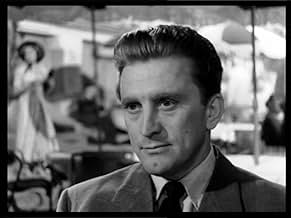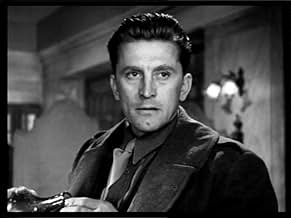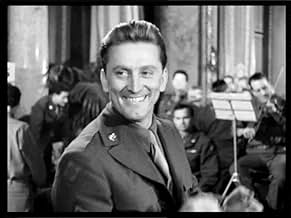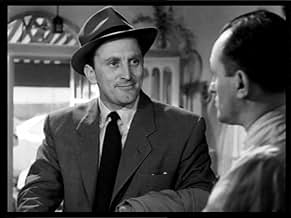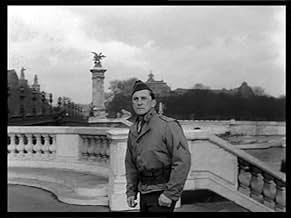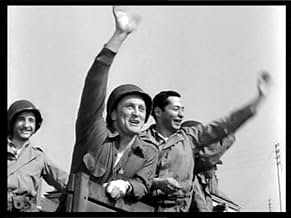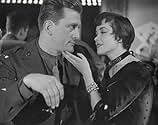Agrega una trama en tu idiomaA former soldier on holiday in the French Riviera recalls his time in France during WWII, and his love for a French peasant woman.A former soldier on holiday in the French Riviera recalls his time in France during WWII, and his love for a French peasant woman.A former soldier on holiday in the French Riviera recalls his time in France during WWII, and his love for a French peasant woman.
- Dirección
- Guionistas
- Elenco
Martine Alexis
- Une prostituée à la Conciergerie
- (sin créditos)
Edmond Ardisson
- L'hôtelier de Villefranche-sur-Mer
- (sin créditos)
- Dirección
- Guionistas
- Todo el elenco y el equipo
- Producción, taquilla y más en IMDbPro
Opiniones destacadas
7B24
How truly odd it is that so little attention to this film is evident in these archives. Apart from some quibbles one might have with its casting, the occasionally stilted dialogue, or some melodramatic nonsense here and there, it really is an important addition to the Kirk Douglas oeuvre as well as a story about a character very much like those he played later in "Paths of Glory" and "Lonely Are the Brave."
Douglas must have had more than a passing hand in choosing roles for himself during his career. Unlike many of his contemporaries (Brando comes to mind), he has played characters that require a fine balance between kinetic displays of a true hero and moments of self-effacing and troubled doubt. It is not so much the quality of the writing at work here as it is his own deliberate and skillful willingness to interpret the role honestly, without regard to any supposed preconceptions of what his audience expects of him.
I write this with a degree of reservation, because I never much cared for his voice or his looks. The fact that I admire his acting skill is perhaps all the more enhanced by this admission, however. With a profile a little less vivid and a better vocal range and timbre, he might have played Shakespeare.
His French colleagues in the present effort are more stereotypical than one cares for. They are made to speak a kind of pidgin English that was generally thought acceptable in 1953 for American audiences. Subtitles accompanying actual French would be requisite for any remake.
Moreover, there is that recurrent tinge of sentimentality and bathos. But I still liked it on the whole, giving it a solid 7 out of 10.
Douglas must have had more than a passing hand in choosing roles for himself during his career. Unlike many of his contemporaries (Brando comes to mind), he has played characters that require a fine balance between kinetic displays of a true hero and moments of self-effacing and troubled doubt. It is not so much the quality of the writing at work here as it is his own deliberate and skillful willingness to interpret the role honestly, without regard to any supposed preconceptions of what his audience expects of him.
I write this with a degree of reservation, because I never much cared for his voice or his looks. The fact that I admire his acting skill is perhaps all the more enhanced by this admission, however. With a profile a little less vivid and a better vocal range and timbre, he might have played Shakespeare.
His French colleagues in the present effort are more stereotypical than one cares for. They are made to speak a kind of pidgin English that was generally thought acceptable in 1953 for American audiences. Subtitles accompanying actual French would be requisite for any remake.
Moreover, there is that recurrent tinge of sentimentality and bathos. But I still liked it on the whole, giving it a solid 7 out of 10.
More than any other movie I've seen, this one draws a dark picture of what the statistical enormity and bureaucratic obscenity of WWII did to individuals during (and after) the Second World War. This is a love story set against the new way of dealing with the logistics of millions of people on the move in wartime Europe -- on either side. The big point is that it's difficult to draw a line between the sides in the brutal impersonality of the events that crush people like the characters in this story.
Kirk Douglas is great, of course, and the direction in the film is always intersting. Hard to believe this was made as late as 53.
See this if you can -- I saw it on TCM recently in a Kirk Douglas festival. For that matter, watch all the Kirk Douglas flicks you can -- the guy had either great taste or great luck.
Kirk Douglas is great, of course, and the direction in the film is always intersting. Hard to believe this was made as late as 53.
See this if you can -- I saw it on TCM recently in a Kirk Douglas festival. For that matter, watch all the Kirk Douglas flicks you can -- the guy had either great taste or great luck.
Act of Love (1953) is a bittersweet love story about the star-crossed relationship between a World War II GI and a young Parisian during the Allied liberation of Paris. KIRK DOUGLAS plays Robert Teller, an Army PFC who, while stationed in France toward the end of World War II, meets and falls in love with a destitute French woman, Lise Gudayec (DANY ROBIN). When Teller seeks permission to marry Lise, his condescending commanding officer (GEORGE MATHEWS) has Teller transferred because he considers the young woman to be an opportunist. The transfer has tragic consequences.
The film's ending is highly emotional when Teller visits the small French Riviera hotel that Lise told him about. At the hotel he has a bitter encounter with his former commanding officer. And it is in one of the hotel rooms that Teller, while recalling the descriptive words of Lise, fully realizes how truly beautiful was their brief love affair. Get out the hankies for this ending. The film marked the debut of French-born Robin in an English-speaking film. Robin, who began her career as a ballerina with the Paris Opera, made her screen debut in 1946 at the age of 19 in the French film Les Portes de la Nuit (Gates of the Night).
Filmed in Paris and on the French Riviera, Act of Love was one of three films that Douglas made abroad during 1952 and '53. The other two were The Juggler (1953), which was filmed in Israel, and Ulysses (1954), which was filmed in Italy. During the three-picture, near-two-year filming schedule, Douglas spent a total of just one month in the United States.
Act of Love also marked the first appearance in an English-speaking film by BRIGITTE BARDOT, who would subsequently gain fame with her pouting good looks and curvaceous figure as France's "sex kitten." In Act of Love, Bardot portrays Mimi, a friend of Lise.
Act of Love was based on the 1949 novel The Girl on the Via Flaminia by ALFRED HAYES. The film's screenplay was by German writer Joseph KESSEL and American novelist-screenwriter IRWIN SHAW. Shaw's other well-known film credits included Fire Down Below (1957) and The Young Lions (1958). Kessel also wrote the French dialogue for the version released in France, titled Un acte d'amour.
For the record: Robin retired from film-making in 1969, after completing the ALFRED HITCHCOCK spy thriller Topaz. She and her husband, British producer MICHAEL SULLIVAN, died in a fire in 1995. She was 68. Robin was known for her dislike of journalists even during the height of her career. Because of this, journalists in 1953 and '54 presented her with the annual Lemon Prize, which is given to the nastiest French actress.
The film's ending is highly emotional when Teller visits the small French Riviera hotel that Lise told him about. At the hotel he has a bitter encounter with his former commanding officer. And it is in one of the hotel rooms that Teller, while recalling the descriptive words of Lise, fully realizes how truly beautiful was their brief love affair. Get out the hankies for this ending. The film marked the debut of French-born Robin in an English-speaking film. Robin, who began her career as a ballerina with the Paris Opera, made her screen debut in 1946 at the age of 19 in the French film Les Portes de la Nuit (Gates of the Night).
Filmed in Paris and on the French Riviera, Act of Love was one of three films that Douglas made abroad during 1952 and '53. The other two were The Juggler (1953), which was filmed in Israel, and Ulysses (1954), which was filmed in Italy. During the three-picture, near-two-year filming schedule, Douglas spent a total of just one month in the United States.
Act of Love also marked the first appearance in an English-speaking film by BRIGITTE BARDOT, who would subsequently gain fame with her pouting good looks and curvaceous figure as France's "sex kitten." In Act of Love, Bardot portrays Mimi, a friend of Lise.
Act of Love was based on the 1949 novel The Girl on the Via Flaminia by ALFRED HAYES. The film's screenplay was by German writer Joseph KESSEL and American novelist-screenwriter IRWIN SHAW. Shaw's other well-known film credits included Fire Down Below (1957) and The Young Lions (1958). Kessel also wrote the French dialogue for the version released in France, titled Un acte d'amour.
For the record: Robin retired from film-making in 1969, after completing the ALFRED HITCHCOCK spy thriller Topaz. She and her husband, British producer MICHAEL SULLIVAN, died in a fire in 1995. She was 68. Robin was known for her dislike of journalists even during the height of her career. Because of this, journalists in 1953 and '54 presented her with the annual Lemon Prize, which is given to the nastiest French actress.
Many things about this movie are charming and have a wistful quality that brings you into its story.
First of all, and I offer my apologies to the absorbing performances, to me the most fascinating aspect of this film is the location; PARIS. But not just any Paris. This is a during and post-WWII Paris. Although released an amazing 8 years after the end of the war, much of the charm of a Paris which lingers in our hearts is still there. This is not travelogue picture with dancing Americans to a Rodgers score. There is a very true-to-life depiction of, what I call, the most elegant city in the world.
This movie tempts us to fall in love again with Paris. All politics aside, please. We see a Paris which many a serviceman or woman probably fell in love with during the war. We see the sights in and around Paris, there are some views of Fontainebleau just outside of the city which make me want to go back and suffer the awful Summer heat inside of it again just to see the gorgeous architecture there.
Second, I liked this story because it ran true. It has few Hollywood formulas -- even to the end it tempts us to see stories like these as they really were. Some happy, some not so. Another reviewer complained about "pidgin French - English" which was heard throughout the movie. I must say that whatever it was, it did not offend my ears and I have friends who live in Paris and have similar accents when they speak English. The accents did bother me -- and neither did the French without subtitles. I do remember a time when Americans knew more about the French language and were proud of it. I still am.
Yet, all through this we have a love story which develops and then unravels due to bureaucratic entanglements.
Finally, if you must see this for one reason, see it for the story and the deft performances. Kirk Douglas, it seems, never made a bad picture - or at least he never gave a bad performance. Every one was absorbing - brought you in, gave you permission to involve yourself with the situations in them. This is not exception. It is a low-key performance, true. But it is no less absorbing than anything he ever did.
Of course there was gorgeous Dany Robin as Kirk Douglas's love interest. Her portrayal of a shy, innocent French girl was perfect considering she was voted "nastiest French actress" that same year. She had a fabulous French career and worked with many famous directors, including Litvak, who also directed "Sorry, Wrong Number", "The Snake Pit" and "Anastasia".
I recommend this to those viewers who still have a little romance in their hearts - but walk with a dose of reality down every turn of their adventures.
First of all, and I offer my apologies to the absorbing performances, to me the most fascinating aspect of this film is the location; PARIS. But not just any Paris. This is a during and post-WWII Paris. Although released an amazing 8 years after the end of the war, much of the charm of a Paris which lingers in our hearts is still there. This is not travelogue picture with dancing Americans to a Rodgers score. There is a very true-to-life depiction of, what I call, the most elegant city in the world.
This movie tempts us to fall in love again with Paris. All politics aside, please. We see a Paris which many a serviceman or woman probably fell in love with during the war. We see the sights in and around Paris, there are some views of Fontainebleau just outside of the city which make me want to go back and suffer the awful Summer heat inside of it again just to see the gorgeous architecture there.
Second, I liked this story because it ran true. It has few Hollywood formulas -- even to the end it tempts us to see stories like these as they really were. Some happy, some not so. Another reviewer complained about "pidgin French - English" which was heard throughout the movie. I must say that whatever it was, it did not offend my ears and I have friends who live in Paris and have similar accents when they speak English. The accents did bother me -- and neither did the French without subtitles. I do remember a time when Americans knew more about the French language and were proud of it. I still am.
Yet, all through this we have a love story which develops and then unravels due to bureaucratic entanglements.
Finally, if you must see this for one reason, see it for the story and the deft performances. Kirk Douglas, it seems, never made a bad picture - or at least he never gave a bad performance. Every one was absorbing - brought you in, gave you permission to involve yourself with the situations in them. This is not exception. It is a low-key performance, true. But it is no less absorbing than anything he ever did.
Of course there was gorgeous Dany Robin as Kirk Douglas's love interest. Her portrayal of a shy, innocent French girl was perfect considering she was voted "nastiest French actress" that same year. She had a fabulous French career and worked with many famous directors, including Litvak, who also directed "Sorry, Wrong Number", "The Snake Pit" and "Anastasia".
I recommend this to those viewers who still have a little romance in their hearts - but walk with a dose of reality down every turn of their adventures.
More than any other movie I've seen, this one draws a dark picture of what the statistical enormity and bureaucratic obscenity of WWII did to individuals during (and after) the Second World War. This is a love story set against the new way of dealing with the logistics of millions of people on the move in wartime Europe -- on either side. The big point is that it's difficult to draw a line between the sides in the brutal impersonality of the events that crush people like the characters in this story.
Kirk Douglas is great, of course, and the direction in the film is always intersting. Hard to believe this was made as late as 53.
See this if you can -- I saw it on TCM recently in a Kirk Douglas festival. For that matter, watch all the Kirk Douglas flicks you can -- the guy had either great taste or great luck.
Kirk Douglas is great, of course, and the direction in the film is always intersting. Hard to believe this was made as late as 53.
See this if you can -- I saw it on TCM recently in a Kirk Douglas festival. For that matter, watch all the Kirk Douglas flicks you can -- the guy had either great taste or great luck.
¿Sabías que…?
- TriviaKirk Douglas also did the French language version's dialogue.
- Citas
Robert Teller: The River Seine. All my life I wanted to see it. Finally I saw it, with a gun in my hand. Travel, twentieth-century style.
- ConexionesFeatured in Veraz (1991)
Selecciones populares
Inicia sesión para calificar y agrega a la lista de videos para obtener recomendaciones personalizadas
- How long is Act of Love?Con tecnología de Alexa
Detalles
- Tiempo de ejecución
- 1h 35min(95 min)
- Color
- Mezcla de sonido
- Relación de aspecto
- 1.37 : 1
Contribuir a esta página
Sugiere una edición o agrega el contenido que falta

